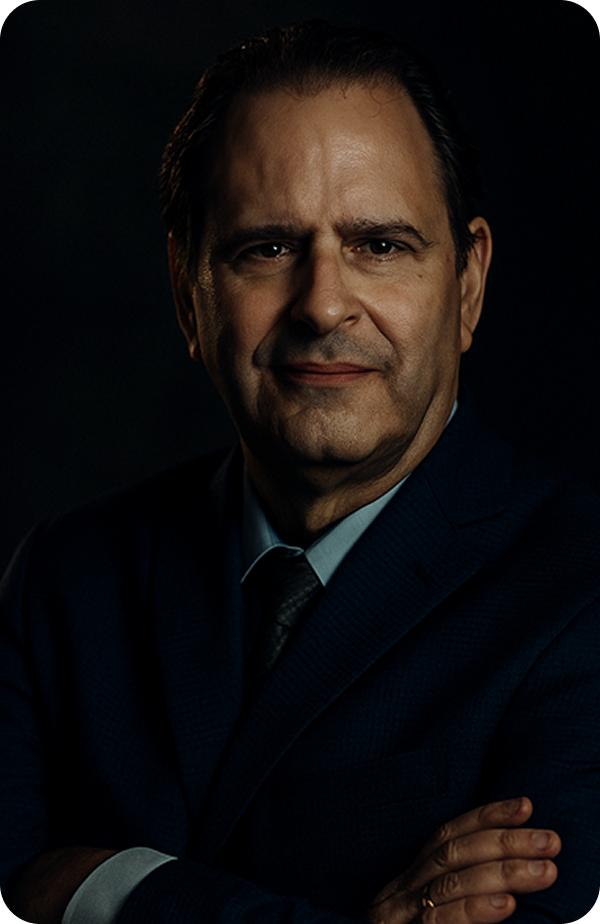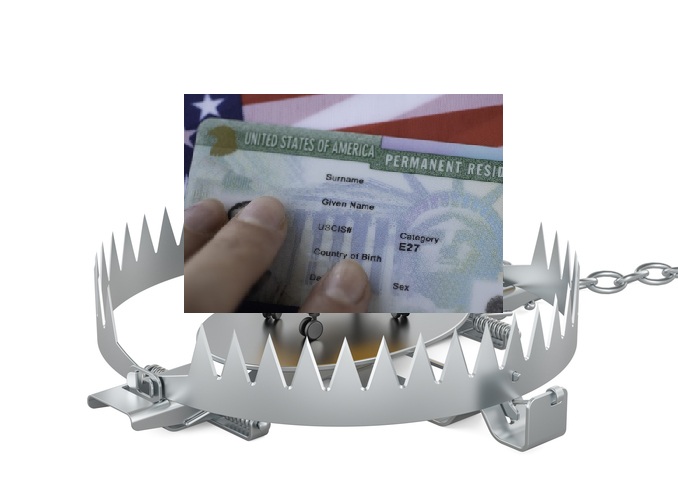NEW: USCIS Marriage Interview Arrest Crisis — Read These FIRST
Before reading anything else, start with Herman Legal Group’s breaking investigations:
- “Why ICE Is Now Waiting at USCIS: How Visa Overstays During Marriage-Based Green Card Applications Are Leading to Arrests”
Must-read overview of new enforcement patterns
Why ICE Is Now Waiting at USCIS - “Married to a U.S. Citizen — But Still Handcuffed: How San Diego ICE Interview Arrests Expose a National Vulnerability (2025–2026)”
Deep dive into the San Diego cases that shocked immigrant families nationwide
Married to a U.S. Citizen — But Still Handcuffed
These two HLG reports are CENTRAL to understanding what is happening right now. This survival guide builds on — and expands — the findings in those investigations.
Additionally, for internal multilingual outreach, the Resource Directory (bottom) includes our Spanish and Arabic versions:
QUICK ANSWER (Read This Before Anything Else)
Yes. ICE can arrest you at your marriage-based green card interview in 2025–2026 — even if:
- your marriage is real
- you overstayed but have no criminal history
- you’ve never been arrested
- your spouse is a U.S. citizen
- you passed biometrics
- your case looks “routine”
Overstay forgiveness does NOT protect you.
Marriage does NOT protect you.
Your U.S. citizen spouse cannot stop the arrest.
Your pending I-485 does NOT prevent ICE intervention.
BUT — with the right preparation, attorney screening, and a concrete safety plan — you can significantly reduce your risk.
This guide shows you how.
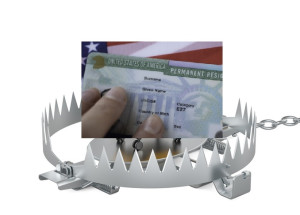
FAST FACTS
- Overstay = civil infraction, NOT a crime — but ICE still arrests overstays with other red flags.
- USCIS and ICE now share interview attendance in real time.
- ICE “target lists” are triggered by:
- prior removal orders
- skipped court dates
- DUIs / dismissed cases
- multiple entries
- old fraud flags
- EWI (Entry Without Inspection)
- The San Diego arrests (documented in the HLG reports above) launched a national trend.
- Under Trump–Vance policy, arrests at interviews are increasing
- USCIS staff cannot warn you that ICE is present.
- ICE increasingly uses undercover officers at interviews.
- Having an immigration lawyer screening your case reduces risk more than anything else.
INTRODUCTION — Why This Guide Exists
Couples across the U.S. — many married for years, with children, mortgages, and stable lives — are being blindsided at what should be the happiest moment of their lives: the marriage-based green card interview.
Instead of walking out united, many are walking out in different directions — one spouse home alone, the other handcuffed and taken to ICE detention.
Reddit is overflowing with posts:
- “Should my husband go to the interview? He overstayed.”
- “Is ICE at USCIS interviews now?”
- “Is San Diego just one location, or is this happening everywhere?”
- “Will they arrest me even if my marriage is real?”
This guide answers every question — with facts, law, data, and practical safety instructions.
SECTION 1 — Why Arrests Rarely Happened Before (2010–2024)
USCIS historically did NOT arrest overstays married to U.S. citizens because:
Overstay Was Usually Forgiven
- Marriage to a U.S. citizen legally forgave visa overstays in most cases.
- No need for ICE involvement.
USCIS Logic: “Why Waste Resources?”
- Approving a bona fide AOS case was cheaper and faster than detaining someone.
Immigration Court Backlogs
- Removal courts were years behind — arresting people created more chaos.
Overstay = Civil, NOT Criminal
- No moral or legal reason to arrest someone for a civil violation.
USCIS Could Simply Issue an NTA
- Historically, they issued Notices to Appear instead of coordinating arrests.
It Was Considered Immoral
- Taking a spouse away during a marriage interview was seen as unnecessary cruelty.
In short: ICE didn’t arrest overstays because everyone knew it was pointless, expensive, and unfair.

SECTION 2 — Why Arrests Are Surging Now (2025–2026)
This is the part most immigrants are NOT prepared for.
1. USCIS Now Reports You to ICE Automatically
Data flows instantly. When you arrive for your interview, ICE knows.
2. ICE Uses Algorithmic Targeting Lists
These flags include:
- old removal orders
- skipped hearings
- database mismatches
- multiple entries
- alleged misrepresentation
- dismissed criminal cases
3. Deterrence Strategy
Arresting overstays at marriage interviews is meant to send a political message.
4. ICE Operates Inside USCIS Buildings
As documented in the HLG investigation linked above, ICE often:
- waits in hallways
- enters interview rooms
- wears plain clothes
- arrests applicants immediately after the interview
5. ICE Is Now Required to Act
Under current enforcement guidance, ICE cannot ignore flags — even for bona fide marriages.

SECTION 3 — The REAL Triggers for Arrest (Not What You Think)
High-Risk Triggers (Actual ICE Priorities)
- Prior removal order
- In absentia removal (missed hearing)
- DUI (even old or dismissed)
- Domestic-related arrests
- Fraud suspicion
- EWI (illegal entry)
- Multiple entries
- Prior asylum filing + withdrawal
Medium-Risk Triggers
- Overstay + prior visa revocation
- Overstay + prior INA 222(g) issue
- Overstay + overstayed multiple times
- Old arrests without convictions
- Administrative immigration records
Myths (Not Triggers)
| Myth | Truth |
|---|---|
| “If marriage is real, I am safe.” | Marriage does NOT protect you. |
| “Overstay is minor, so harmless.” | Overstay plus ANY red flag = arrest risk. |
| “No criminal record means safe.” | Wrong — old dismissed charges often trigger arrests. |
| “USCIS interview means approval.” | Wrong — interviews now flag people to ICE. |
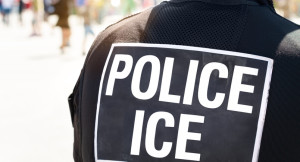
SECTION 4 — What Immigration Lawyers Are Seeing Now (HLG Observations)
From 30+ years of national practice, Herman Legal Group now observes:
- ICE entering USCIS interview rooms
- Undercover agents in waiting rooms
- People arrested with no criminal record
- Same-day ICE + NTA issuance
- Interviews rescheduled strategically for ICE
- U.S. citizen spouses shocked, unprepared, left alone
- Arrests during second “Stokes” interviews skyrocketing
This is not isolated.
This is the new national pattern.
SECTION 5 — Who Is MOST at Risk (Ranked)
1. Anyone with a Prior Removal Order
(Even from 15–20 years ago.)
2. Anyone Who Missed an Immigration Court Hearing
3. Anyone with Criminal History
DUIs, theft, domestic disputes, drugs, juvenile arrests, dismissed cases.
4. People Who Entered Without Inspection (EWI)
Huge red flag.
5. Multiple Entries / Visa Issues
6. People Applying Without a Lawyer
7. People Whose Spouse Is Unprepared
8. People Without a Family Emergency Plan
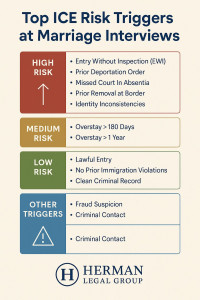
SECTION 6 — BEFORE THE INTERVIEW: Your Legal Survival Checklist
STEP 1 — Get Your Records
- FOIA USCIS
- FOIA ICE
- FOIA CBP
- FBI Background Check
- State criminal checks
STEP 2 — Hire a Competent Attorney
Attorney must review:
- entries
- immigration history
- removals
- asylum records
- criminal history
- fraud flags
STEP 3 — Prepare Your Spouse
They must understand:
- how to answer
- not to overshare
- what to do if ICE walks in
STEP 4 — Prepare Your Family
Have:
- emergency contact list
- attorney number
- plan for kids
- financial plan
- passport copies
STEP 5 — Bring Only Required Documents
STEP 6 — Decide If It’s Safe to Attend
This step MUST be attorney-driven.
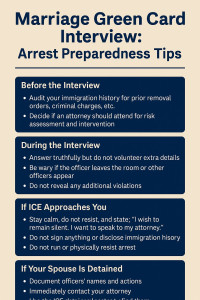
SECTION 7 — DURING THE INTERVIEW: How to Protect Yourself in Real Time
When Interview Begins
- Ask: “Is any law enforcement present today?”
- Speak clearly; short answers
- Do NOT volunteer anything unnecessary
- Never joke
- Never argue
If ICE Walks In
Say ONLY:
“I wish to remain silent. I want to speak to my attorney.”
Do NOT
- sign anything
- resist
- argue
- explain
- answer extra questions
Spouse Should
- note badge numbers
- stay calm
- call attorney immediately
SECTION 8 — IF ICE ARRESTS YOU: Emergency Protocol
You Must
- remain silent
- request lawyer
- refuse voluntary departure
- demand destination (“Where are you taking me?”)
Your Family Must
- call attorney
- locate you in ICE detention using
ICE Detainee Locator - prepare documents for bond/cancellation
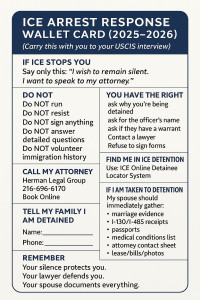
SECTION 9 — Hidden Insights You Will NOT Hear from USCIS
- ICE has “target lists” specifically tied to USCIS appointments.
- Undercover ICE is now normal at marriage interviews.
- Some arrests happen AFTER the interview — in the parking lot.
- USCIS officers cannot warn you even if they know ICE is present.
- Dismissed criminal charges are still used as arrest triggers.
- ICE relies heavily on database mismatches — errors can trigger arrests.
- Bringing a lawyer may reduce your statistical risk.
SECTION 10 — Community Impact (Who Suffers Most)
- Military families
- Parents of U.S. citizen children
- Mixed-status families
- Students married to U.S. citizens
- Long-term overstays with deep community ties
- Immigrants from high-scrutiny countries
Arrests destabilize entire households.
SECTION 11 — What We’re Seeing in 2025–2026
- More second interviews (Stokes)
- More surprise ICE appearances
- More arrests of applicants with clean records
- More NTAs issued same-day
- More data-sharing across DHS components
- More public confusion + misinformation
This is a systemic shift, not a fluke.
SECTION 12 — FAQ (30+ Q&A Format)
Q: Can ICE arrest me at my green card interview if I overstayed?
A: Yes. Overstay is civil — not a crime — but ICE can still arrest if other red flags (prior removal, criminal history, multiple entries, fraud suspicion) exist.
Q: Does being married to a U.S. citizen protect me from arrest?
A: No. Marriage does not grant immunity; ICE treats marriage-based adjustment applicants same as any other when “targeted.”
Q: Is having no criminal record enough to keep me safe?
A: No. Minor misdemeanors, dismissed or expunged cases, or even just arrests — especially old ones — may trigger detention under ICE’s enforcement priorities.
Q: What if I entered legally on a visa, then overstayed? Is that safer?
A: Not necessarily. Multiple entries or visa overstays may still flag your record. Also, if ICE discovers prior visa violations, they may act.
Q: Can I cancel or reschedule my interview if I’m afraid?
A: Possibly — but many have reported USCIS denying requests. If you have serious red flags, consult a lawyer first.
Q: Does hiring an attorney reduce my risk?
A: Yes. Attorneys help uncover prior removal orders, criminal issues, or database flags — and can advise whether it’s safe to attend, or postpone.
Q: Should I attend if my spouse has a criminal history?
A: It depends. Spouse’s issues may make ICE more suspicious. You need a lawyer to assess risk.
Q: Can ICE officers enter the interview room?
A: Yes. Undercover arrests are becoming common — sometimes without prior warning.
Q: If ICE arrests me, should I sign a voluntary return form?
A: No. Signing may forfeit rights. You should remain silent and ask for a lawyer.
Q: Can I refuse to answer ICE questions?
A: Yes. You have the right to remain silent and request counsel.
Q: What happens to my spouse and children if I’m detained?
A: They may be separated, lose financial support, and face complex legal and emotional challenges. That’s why a family emergency plan is essential.
Q: How can I find out if I have a prior removal order?
A: Request history via FOIA; also check old court records. Many people are unaware of “administrative closures” or prior proceedings.
Q: Should I bring documents proving my long-term residency or community ties?
A: No. Only bring required documents. Extra documents may be misinterpreted or trigger suspicion.
Q: Does having U.S.-born children help protect me?
A: Not from green card interview arrest — ICE focuses on immigration status, not family ties, when triggering detentions.
Q: Can being undocumented but married protect me?
A: No. Marriage doesn’t guarantee protection — ICE can still detain if you’re targeted.
Q: Is sanctuary at USCIS possible?
A: Rarely. USCIS offices are not safe zones like courts; ICE is willing to enter.
Q: Can I reschedule if I am scared or feel unsafe?
A: You can request it — but many have been denied. Rescheduling may delay but not eliminate risk.
Q: What if I have a pending asylum or TPS application?
A: That may increase flagging risk, especially if prior denial or removal order exists. Consult counsel.
Q: Can I go through Adjustment of Status (AOS) without an interview?
A: Sometimes — but given current enforcement, absence of interview does not guarantee immunity. ICE may find you later.
Q: Are Spanish- or Arabic-speaking applicants more at risk?
A: Possibly — language/cultural difference may make fraud suspicion higher, but risk depends more on record and entries than ethnicity. Still, having an attorney fluent in your language helps.
Q: Does having paid taxes or having a job help protect me?
A: Not legally. Economic ties don’t prevent ICE from enforcing immigration law once red-flagged.
Q: If my spouse is U.S. citizen, can they request ICE to release me?
A: No — only ICE and immigration court control detention and release decisions.
Q: Can community support (letters, affidavits) help if detained?
A: Yes — for bond hearings or cancellation of removal; but only if gathered quickly and by counsel.
Q: Should I stop work/resume only after green card approved?
A: That’s a personal decision. But working without work authorization when undocumented — or after visa overstays — may trigger additional risks if ICE investigates.
Q: Are there alternatives to in-person interviews now?
A: Rarely — USCIS still requires interviews for many marriage-based AOS cases. Remote or waiver options are limited.
Q: Can I ask for a “safe location interview” (e.g., ICE-free office)?
A: There’s no legal provision granting that. USCIS doesn’t guarantee ICE-free venues.
Q: What if ICE delays arrest until after I leave the interview?
A: That has happened. ICE may follow you home — so plan safe travel and shelter.
Q: Can I apply for a waiver or stay of removal if detained?
A: Possibly — depending on length of U.S. presence, hardship to children/spouse, and prior records. Consult counsel immediately.
Q: If USCIS denies my I-485, is arrest likely?
A: Increased. Denial may trigger ICE interest — especially if red flags exist.
Q: What if I’m already working under valid EAD?
A: Work authorization doesn’t shield you from immigration enforcement if ICE believes you are removable.
Q: Can I record the interview with my phone?
A: Doing so can be risky. Some USCIS offices forbid recordings; if ICE appears, recordings may be seized. Consult counsel on safe practices.
Q: Does applying with a domestic-spouse visa (K-1) reduce risk?
A: No — K-1 entrants with overstay or prior entries are subject to the same targeting criteria.
Q: What if I have an approved but unfiled I-485?
A: No protection. ICE considers presence, prior records, entries, not just pending paperwork.
Q: Can I avoid arrest by applying from abroad instead?
A: Possibly — consular processing may reduce risk of on-site ICE arrest, but it has its own risks (inadmissibility, fraud suspicion, long wait, travel constraints).
Q: If I’m from a country under travel ban or high scrutiny, does risk increase?
A: Potentially — such countries often have more database flags or stricter fraud screening. A thorough attorney review is strongly recommended.
Q: What if I received a Request for Evidence (RFE) instead of interview?
A: RFEs are lower-risk — but once you submit response and await interview, risk returns.
Q: Should I wait until after citizenship to travel or adjust status?
A: Many families choose to wait — safer but may cause hardship. Decision depends on risk tolerance and personal circumstances.
Q: What if I already applied and was scheduled for interview — but worried now?
A: Contact an attorney immediately. Do not assume you are safe. Evaluate whether to proceed or request postponement based on full record.
SECTION 13 — Key Takeaways
- Overstay forgiveness does not protect you from ICE.
- Marriage does not protect you from arrest.
- Interviews are now enforcement events, not just paperwork checks.
- Real triggers include prior removal, multiple entries, DUIs, fraud flags.
- Undercover ICE at interviews is increasingly common.
- Hiring an immigration lawyer is the single best safety measure.
- Always run FOIA + FBI checks BEFORE attending.
- Prepare a family emergency plan.
- If ICE arrests you: remain silent, ask for lawyer, sign nothing.
- Preparation = survival.
Need Protection Before Your Green Card Interview? Don’t Go In Blind.
One wrong step at a marriage-based interview can trigger detention — even for spouses of U.S. citizens.
Under today’s enforcement climate, strategy is no longer optional.
📞 Book a Confidential Strategy Session With Herman Legal Group
For 30+ years, Richard Herman and HLG have helped thousands of immigrant families prepare, protect, and defend themselves against surprise ICE actions — including interview detentions and wrongful arrests.
Why Clients Come to Us Before the Interview:
- We review your entire immigration + background history to spot hidden risks ICE will exploit.
- We identify enforcement triggers (overstay, old removal orders, prior entries, prior marriage issues, misrepresentations).
- We create a customized “Interview Safety Plan,” including backup legal protection.
- If risk is high, we prepare waivers, motions, and legal shields in advance so you are not caught defenseless.
- We can attend the interview with you—your best protection is having an experienced immigration attorney present.
- We coordinate with your U.S. citizen spouse to strengthen credibility, consistency, and documentary preparation.
This is your family.
Do not walk into a federal building alone when ICE is waiting in the hallway.
Your Consultation Is Private. Judgment-Free. Focused on One Goal:
Protecting you and your spouse.
Schedule your confidential strategy session now
Same-day and emergency appointments available.
Call Richard Herman at 216-696-6170

Resource Directory
Government Resources
- USCIS Adjustment of Status (I-485)
- USCIS Policy Manual — Volume 7 (AOS)
- ICE Detainee Locator System
- EOIR Immigration Courts
- Federal Register DHS Rulemaking
- TRAC Immigration Data
Media Coverage of Interview Arrests
- New York Times — San Diego marriage interview arrests
- Reuters — ICE/USCIS data-sharing reporting
- AP News — national enforcement trends
- NBC San Diego — on-site arrest reporting
- NDTV & India Today — international coverage

